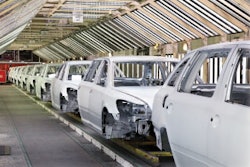
 A group of nearly 450 organizations ranging from environmental groups to labor organizations to health care providers and other businesses have joined forces as “Safer Chemicals, Healthy Families,” which will today launch a campaign pressuring retailers to drop products containing chemicals that the coalition has deemed unsafe. This initiative may be on the forefront of this issue, as public concern and new chemical safety regulations shine a spotlight on the chemicals industry.
A group of nearly 450 organizations ranging from environmental groups to labor organizations to health care providers and other businesses have joined forces as “Safer Chemicals, Healthy Families,” which will today launch a campaign pressuring retailers to drop products containing chemicals that the coalition has deemed unsafe. This initiative may be on the forefront of this issue, as public concern and new chemical safety regulations shine a spotlight on the chemicals industry.
Giants from the processing sector — Seventh Generation, Stonyfield Farms and Organic Valley among them — have teamed up with public health organizations, organized labor and others to urge retail outlets to drop consumer products containing chemicals the group labels as toxic.
As Safer Chemicals, Healthy Families, this coalition will begin its push for “safer” consumer products by targeting ten retail outlets to get onboard with its retail detox. These outlets are:
- Walmart
- Target
- Costco
- Kroger
- Walgreens
- Home Depot
- CVS Caremark
- Lowe's
- Best Buy
- Safeway
In response to the initiative, American Chemistry Council (ACC) Vice President of Communications, Anne Kolton, said in a statement, “Our companies go to great lengths to help Americans make informed decisions about which products are best for their families. We undertake extensive scientific analyses to evaluate potential risk of our chemistries, from development through use and safe disposal. We work with retailers and companies that use chemicals in the products they manufacture to provide them with information about our chemicals so they are used safely.”
This push from Safer Chemicals, Healthy Families comes on the heels of yesterday’s introduction of the Safe Chemicals Act of 2013, initially supported by 29 U.S. Senators. The act aims to update the Toxic Substances Control Act (TSCA), an objective that receives broad support, even from the chemical industry itself.
The ACC released a statement yesterday, saying, “The current law needs to be improved to reflect modern scientific developments in the assessment and management of chemicals. A modernized TSCA must put the protection of human and environmental health and safety first, while also enabling America to retain its place as the world’s leading innovator.”
Also acknowledging the need for change, but offering more tepid support for a TSCA overhaul, Society of Chemical Manufacturers and Affiliates (SOCMA) Vice President of Government and Public Relations, Bill Allmond, said in a statement, “We need to identify those areas of TSCA reform where there is some consensus to increase the prospect that there will be support from Democrats and Republicans alike. Rather than waiting for a silver bullet to fix everything, let's find areas both sides can agree on and move them forward through bipartisan cooperation.”
Of course, aggressive backers of tighter restrictions on chemicals will suggest that two coalitions, one with at least 29 senators and the other including hundreds of companies and public health organizations, may provide all the consensus needed for reform of the chemicals industry.
Andy Igrejas, Executive Director of Safer Chemicals, Healthy Families, said of the legislation, “Americans across the political spectrum have woken up to the fact that unregulated toxic chemicals get into their homes and their bodies. It is uniformly unnerving. The Safe Chemicals Act would establish common sense limits on these chemicals that are broadly popular and long overdue.”
The bill will likely face resistance from political opponents and industry as legislators work out the details of how the Environmental Protection Agency will be given the authority to restrict chemicals deemed “dangerous” and how to update the scientific methods used to make such determinations.
Business interests are certainly right alongside public health concerns in this debate. It’s no accident that companies like Seventh Generation and Organic Valley are keen to push less “green” companies off store shelves and reduce competition, just as chemical industry associations are reticent to restrict access to products their members produce.
Wading through the wealth of often conflicting public health studies — and settling on a scientific method that ensures lobbyists, corporations and activists can’t buy favorable results — will be key in the ongoing debate over which chemicals pose significant threat to public health and what exactly we should do about it.





















